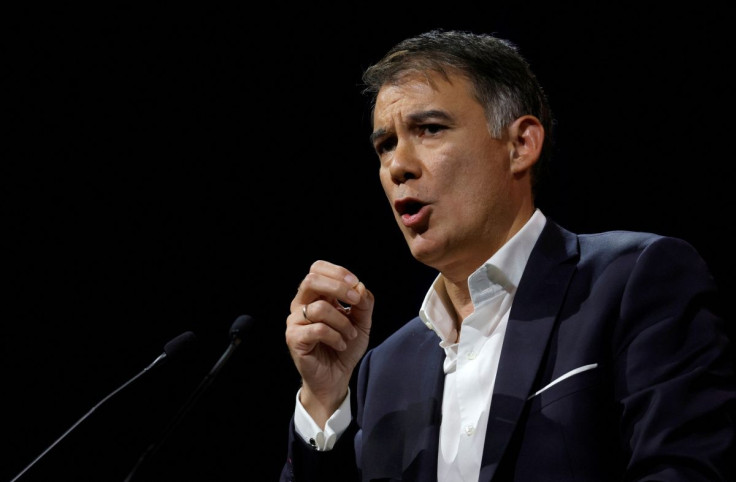French Left Agrees In Principle On Rare Coalition Deal To Take On Macron

France's Socialist Party and the hard-left La France Insoumise (LFI) agreed in principle on Wednesday to run together in June parliamentary elections and try to deprive newly re-elected President Emmanuel Macron of a majority.
If confirmed, the coalition pact, which the Greens and Communists approved earlier this week, will be the first time the French left has united in 20 years - but under the helm of the eurosceptic, hard-left LFI this time around.
"We can and will beat Emmanuel Macron and we can do it with a majority to govern for a radical programme," LFI lawmaker Adrien Quatennens told Franceinfo radio.
The deal took shape under the leadership of LFI's firebrand chief Jean-Luc Melenchon, who broke from the Socialist Party (PS) in 2008 after failing to dilute its pro-European Union stance. He wants to "disobey" the bloc's rules on budget and competition issues and challenge its free-market principles.
The deal, which still needs to be approved by the PS national committee, says both the traditionally very pro-European PS and eurosceptic LFI agree to "disobey" or "depart" from EU rules on a number of policies.
Both parties, a joint statement said, committed to pushing the EU to be more focused on social rights and the protection of the environment.
Macron, whose swearing-in ceremony for his second term will be held on Saturday, has not yet announced a widely expected change in prime minister. Some of his pro-EU camp's candidates for the June elections should be known later this week.
"COMPLICATED"
Policies of the new left-wing alliance include plans to lower the retirement age to 60, raise the minimum wage and cap prices on essential products.
If confirmed, Melenchon's success in striking a deal with the Socialists, long the dominant force on the left, would mark a turning point for a party that has given France two presidents since World War Two and been a driving force for European integration.
But the Socialists had little leverage in the talks. Their presidential candidate, Paris Mayor Anne Hidalgo, garnered a meagre 1.75% of votes cast in last month's ballot, while Melenchon was third with 22%.
PS veterans, including ex-party leader Jean-Christophe Cambadelis, have already called on fellow members to block the deal, saying it could mark the end of a pro-EU force on the left.
"It will be complicated to get it approved in the national committee," Corinne Narassiguin, a former PS lawmaker, told Reuters.
In a sign of the PS's recent collapse, Narassiguin said the deal - under which only one lawmaker from each party that joins the alliance will run in any constituency - foresees that the PS would have only 70 candidates in mainland France, and possibly a few more in oversees territories.
The French lower house has 577 lawmakers.
A recent Harris Interactive poll showed a united left and an alliance between Macron's centrist party and the conservatives running neck and neck, each with 33% of the legislative vote. However, in France's two-round electoral system, projections show this could still yield a majority of seats for Macron.
© Copyright Thomson Reuters 2024. All rights reserved.





















